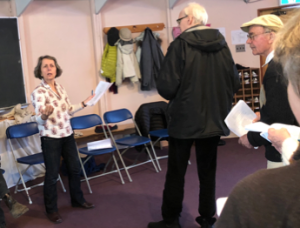20 Mar Mystery Drama Initiative in Vancouver
 In Vancouver Marie-Reine Adams, a coworker at Cascadia (our urban Camphill), has been working with an enthusiastic group to perform the medieval scenes ( 6, 7, 8 and 9) from Steiner’s second mystery drama, The Soul’s Probation. This group has been practising twice a week for an hour though not everybody can come each time. The performance is scheduled for March 25th, Palm Sunday at the Waldorf School. There will be a talk at 5:30 pm on the Knights Templar with the evening performance of the four scenes at 7 pm.
In Vancouver Marie-Reine Adams, a coworker at Cascadia (our urban Camphill), has been working with an enthusiastic group to perform the medieval scenes ( 6, 7, 8 and 9) from Steiner’s second mystery drama, The Soul’s Probation. This group has been practising twice a week for an hour though not everybody can come each time. The performance is scheduled for March 25th, Palm Sunday at the Waldorf School. There will be a talk at 5:30 pm on the Knights Templar with the evening performance of the four scenes at 7 pm.
Marie-Reine comes from Botton Village in England where, together with a professional director, she worked with companions and coworkers to perform the first three mystery dramas. She also helped with the presentation of the third mystery drama in Stroud, Gloucestershire.
The challenge now is for everyone to learn their lines. Another challenge is that a few people have had to drop out for one reason or another. She is hopeful that she will find all the players she needs.
At one of the first practices we, who are the peasants (scene 6), were asked to find the gesture of our words. Next we connected the words with the gestures.
In his course on speech and drama, Steiner said that the spoken word is transformed gesture; it is bodily motion, inhibited and changed to sound. We enjoyed practising each others’ lines with the appropriate gesture. Each gesture was different; this helped us gain a certain mobility. There are twelve peasants in all. It is no surprise that each one represents a sign of the zodiac.
Hans Pusch, who translated as well as worked with stage productions of the mystery dramas for many years, wrote that each drama wants to be read aloud and listened to, in the way that we listen to a musical score. It is meant not only for eyes looking at the paper, but for ears and larynxes that are active.
One of problems in connection with staging the mystery dramas is the lack of outer action. All the more that the gestures and speech need to be intensified. The actor has to have the last word of the sentence in mind already at the start. This helps the listener to grasp quickly and clearly the underlying thought.
Marie-Reine has us put down our “scores” during practices so that we pay attention as each fellow player grapples with his part. Such intense listening helps everyone. One of our players said that working with his lines has helped him to enliven and project his words more as he goes about his daily life.
We are hopeful that Marie-Reine will continue to work with us on these mystery dramas in some capacity in the months after Easter.
Susan Koppersmith